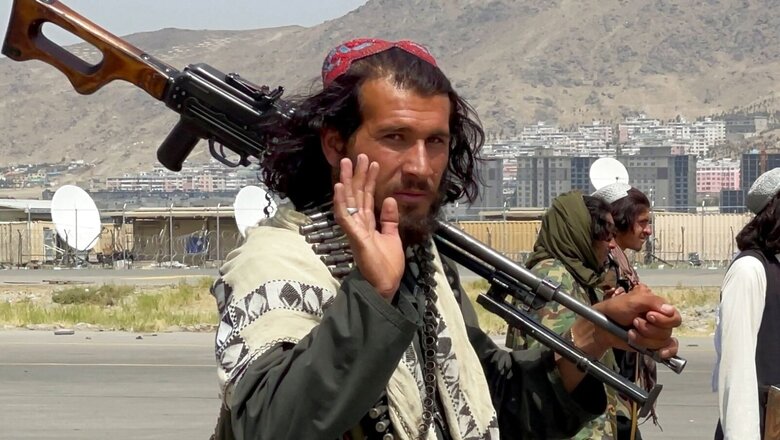
views
Even before he became POTUS, former President Donald Trump viewed the war in Afghanistan as a “complete waste”. His poll campaign to the Presidency in 2016 promised that US troops would return and American money would not be wasted in the war-ravaged country.
So, a year before the next election in 2020, his administration stepped up efforts to fulfill the poll promise of closing the ‘endless war’. As a result, US started direct negotiations with the Taliban – the same group who on the ground were continuing to attack NATO forces.
Not only did the US start direct talks with the Taliban political leadership in Doha, but was also accused of excluding the Afghanistan government led by then President Ashraf Ghani, at crucial stages of the dialogue.
While speaking exclusively to CNN-News 18 after the fall of Kabul, Ashraf Ghani’s brother Hashmat Ghani made a similar accusation. He said, “We have been fighting other people’s war forever and Afghans were fighting each other. Trump struck a deal directly with Taliban, side-lined the government, and now they want Afghans to fight among themselves.”
This deal by US, many believe, was the first step in legitimising the Taliban.
Going ahead, on February 29, 2020, the US and Taliban struck a deal: the Doha Agreement. It said, “Agreement for Bringing Peace to Afghanistan between the Islamic Emirate of Afghanistan which is not recognized by the United States as a state and is known as the Taliban and the United States of America.”
Even though the US used the caveat “not recognized”, the fact that the country chose to strike a deal with the group, made other nations like India question the very premise of legitimacy, if not the very legally technical word ‘recognition’.
In July this year, when Indian officials started accepting that they were indeed trying to get in touch with the top political leadership of Taliban in Doha, CNN-News18 asked a source on whether there was ever concern that even taking to the Taliban would give them certain legitimacy. They said that if the US had struck a deal with them, the question of legitimacy would not stand in the way.
China has engaged with the Taliban leadership openly. Even as the Taliban were fighting an elected Ghani government and the Afghan national army on the ground, China released a picture and a statement of Wang Yi meeting the Taliban political leader Mullah Abdul Ghani Baradar.
Baradar led a full delegation including the heads of the Taliban’s religious council and publicity committee to Tanjin, China.
The Chinese foreign ministry stated after the meeting that, “Afghanistan belongs to the Afghan people, and its future should be in the hands of its own people.”
“The Afghan people now have an important opportunity to achieve national stability and development,” China said. This statement, July 28, came a good fortnight before the Taliban toppled the Ghani government, forcing the President to flee.
China, through its statement, had already indicated that they considered Taliban legitimate when the country said Afghanistan’s “future should be in the hands of its own people.”
This was drawing a distinction that the government so far was not an Afghan government, but one that was a proxy of the US and hence, not legitimate. China was also one of the handful countries that continued to have its embassy in Kabul open when all others were evacuating.
The Russian embassy too remains open in Kabul and the Russians have also been engaging the Taliban.
The Russian envoy to Kabul met the Taliban after the fall of the capital and referred to the meeting as “friendly”. However, from Moscow, cautious words have emerged.
Foreign minister Sergey Lavrov has called for a broad dialogue between all political forces in Afghanistan saying the Taliban does not control the entire territory – referring to Panjshir.
The Russian Deputy Chief of Mission in India Roman Babushkin drew a distinction between working with, and recognizing Taliban. Interestingly, he added that if at all Taliban has to be recognized, the “first step has to be a relevant consensus at the United Nations first in Security Council”.
The reference here is to the United Nation’s credentials committee. A Credentials Committee is appointed at the beginning of each regular session of the General Assembly. The Committee is mandated to examine the credentials of representatives of Member States and to report to the General Assembly.
However, a source pointed that this was only a time-buying move. There is no bar on any country whether or not to recognize another country or government bilaterally even if the UN may not approve the credentials.
The example cited here is of the previous Taliban regime under Burhan-u-ddin Rabbani. While the Credentials Committee had in October 1996 deferred a decision on accepting credentials from Afghanistan, the UN statement said the secretariat received a note verbale from the Ministry of Foreign Affairs of the Islamic State of Afghanistan, stating that the credentials issued by President Rabbani were “not authoritative and legally valid.”
However, despite the confusion at the UN, Pakistan, UAE and Saudi Arabia had recognised the previous Taliban regime.
Meanwhile, the US too has been posed the question of recognition after having legitimized Taliban. In an interview to CNN’s Jake Tapper, Secretary of State Antony Blinken said, “A future Afghan government that upholds the basic rights of its people and that doesn’t harbor terrorists is a government we can work with and recognize.”
So, when Indiann ambassador to Qatar, Deepak Mittal, met Taliban’s political leader Sher Mohammad Abbas Stanekzai in Doha on Tuesday, the government immediately released details of the meeting.
However, sources said that it should by no means be viewed as India looking at recognizing the Taliban regime just yet. When CNN News-18 asked MEA spokesperson, Arindam Bagchi on why the Taliban sought the meeting with the Indian ambassador in Doha, he said he did not want to speculate, adding that it appeared the group were reaching out to countries that have interest in the region. This, perhaps, is giving another indication of the Taliban too seeking greater legitimacy that they believe will pave the way for recognition.
Diplomats and political leaders of various countries continue to use a similar phrase – “we will go by Taliban’s actions, not claims”. Most believe that Taliban is seeking greater international acceptance and ultimately recognition from more countries this time around. But almost all countries are in wait and watch mode. Whether the word play being used currently like – working along with, legitimacy and recognition – can put pressure on Taliban to fall in line, will determine the international community’s collective clout.
Read all the Latest News, Breaking News and Assembly Elections Live Updates here.
















Comments
0 comment